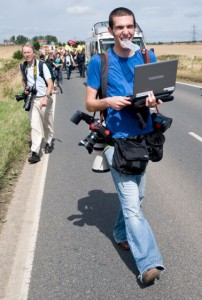As reported by theregister.co.uk and the British Journal of Photography, new terrorism guidance for police officers has been issued. The National Police Improvement Agency (NPIA) has released its update ‘Practice Advice’ on stop-and-search powers, with reference to the Terrorism Act 2000.
The advice includes guidance for police officers on how to deal with photographers, but is not final. It has now been circulated to forces for final comments. After further consulatation it will need to be endorsed by the Assosiation of Chief Police Offices. (ACPO) [information courtesy of photojournalist Marc Vallée]
This announcement follows up from Marc Vallée’s assessment of the situation here and here.
The guidance:
“The Terrorism Act 2000 does not prohibit people from taking photographs or digital images in an area where an authority under section 44 is in place. Officers should not prevent people taking photographs unless they are in an area where photography is prevented by other legislation.
“If officers reasonably suspect that photographs are being taken as part of hostile terrorist reconnaissance, a search under section 43 of the Terrorism Act 2000 or an arrest should be considered. Film and memory cards may be seized as part of the search, but officers do not have a legal power to delete images or destroy film.
“Although images may be viewed as part of a search, to preserve evidence when cameras or other devices are seized, officers should not normally attempt to examine them. Cameras and other devices should be left in the state they were found and forwarded to appropriately trained staff for forensic examination. The person being searched should never be asked or allowed to turn the device on or off because of the danger of evidence being lost or damaged.
“Film and memory cards may be seized as part of the search and images may be viewed as part of a search.”
Marc Vallée asks on his blog:

“What is going on here? Does Section 43 of the Terrorism Act 2000 override the long held journalistic protection of Special Procedure Material under the Police and Criminal Evidence Act (PACE)?
“As an article on the EPUK website put it last year: ‘Under the Police and Criminal Evidence Act, material such as a journalist’s notes, photographs, computer files or tapes are classified as Special Procedure Material, which have a higher level of protection than ordinary possessions.’
“Which means if the police want to look at such material then they would have to go in front of a judge and explain why.”
Pictured: A press photographer files images on the move as environmental activists march from the Camp for Climate Action to Kingsnorth Power Station Hoo, Kent, England on Saturday August 9 2008. 2,000 campaigners marched on the Power Station with the aim to shut it down for the day. (Photo Marc Vallée/marcvallee.co.uk) (c) Marc Vallée, 2008.
In the meantime, until further information is obtained, Ray Mincoff, the NUJ legal editor, has issued this statement:
“We welcome the publication of unequivocal guidance showing that the Terrorism Act does not prohibit the taking of photographs in public places.
“The authorities must now ensure that police officers are aware of the limits to their powers. It must also be made crystal clear that the right to seize film and memory cards can only be used in the very exceptional circumstances where there are strong grounds for suspecting someone of being a terrorist.
“If section 43 of the Act ends up being casually used by officers in the same slapdash manner as other parts of the legislation, it would seriously inhibit the ability of journalists to work in our cities. The police cannot routinely use anti-terror or other legislation to stop journalists in their lawful and proper work. Neither must they see these guidelines as a green light to seize journalistic material, the special nature of which is recognised by law.
“We will also be looking carefully at other aspects of the guidelines to assess other possible effects on civil liberties and the free press.”
UPDATE:
Marc Vallée wrote to the National Police Improvement Agency (NPIA).
“Under the Police and Criminal Evidence Act, material such as a journalist’s notes, photographs, computer files or tapes are classified as Special Procedure Material, which have a higher level of protection than ordinary possessions,” he wrote.
“What is the view of the NPIA on this in the context of stop-and-search powers like S43? Could a UK Press Card carrying photographer use Special Procedure Material to stop or limit the scope of a stop-and-search under S43? or S44?”
They responded:
“There has been no change to the law. These guidelines remind officers that they can only stop-and-search photographers in exceptional cases where they believe they are involved in some kind of terrorist information gathering activity.”
UPDATE TWO (02/12/08): the NPIA has now added this statement:
“The Practice Advice makes it clear that there has been no change in the law. Journalist material will continue to enjoy the higher level of protection offered under PACE.
“For example, if a police officer suspects that photographs are being taken as part of terrorist information gathering they will rightly investigate. But once the stopped person makes it clear that they are a journalist then this will usually reassure police that they have legitimate reasons for taking photographs.”
